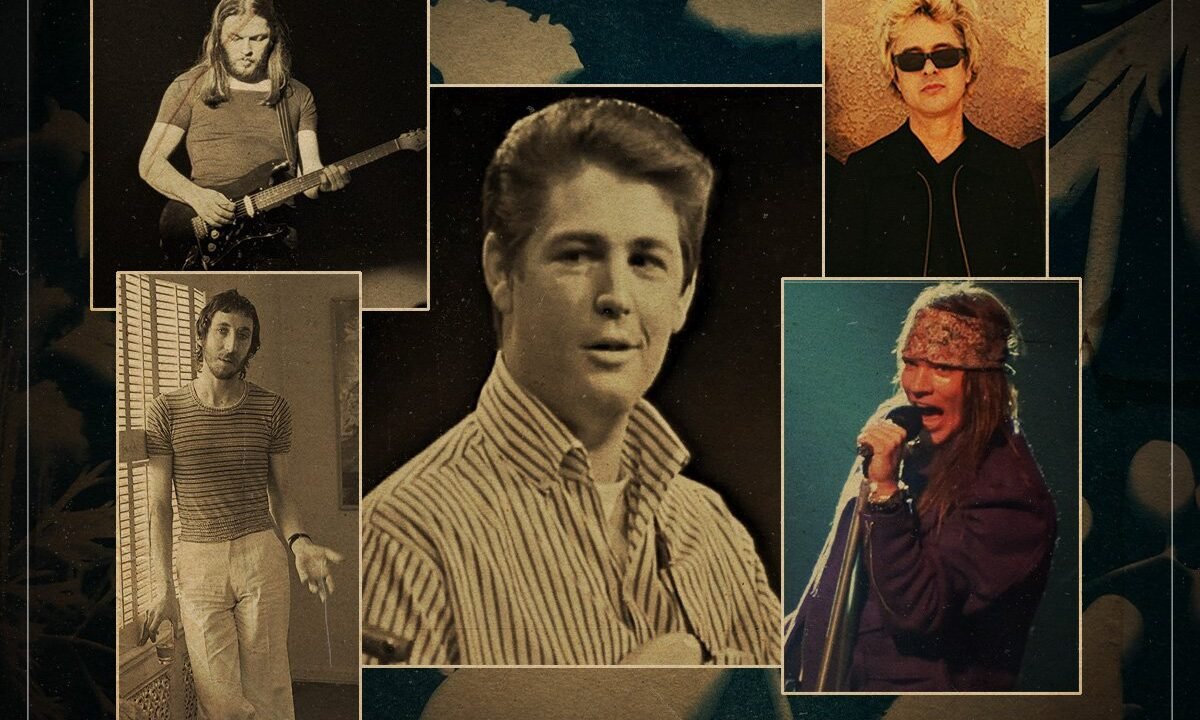
‘Turbo Lover’ – Judas Priest

Judas Priest have always lived and breathed all things metal. As much as Black Sabbath got stuck with the title of genre forefathers, Rob Halford was the first one to don the studs and was proud to claim the genre for himself when he found his first metal subjects out in the wild. But while any metal band has their fair share of dips throughout their career, no one expected the kings of all things heavy to trade in their guitars for synthesisers halfway through the 1980s.
And yet here we are talking about ‘Turbo Lover’. Granted, while this is probably the best song on the album Turbo, you can tell that something’s already off from the first time Halford opens his mouth. There are the makings of a great track somewhere in here, but there are also pieces that sound like the sound effects left over from some forgotten Sega Genesis game that would have been laughed out of the room on any other Priest project.
It’s not nearly as esoteric as what they would later do on albums like Nostradamus, but the cracks were already starting to form for the band midway through the decade. They still had a long way to go before they started making anything objectively bad, but you’ve got a problem when you listen to a metal album and don’t know whether you show break out the Flying V or the Casio to play along with it.
‘Eminence Front’ – The Who

Pete Townshend always took precious care of the music that he wanted to make with The Who. He was creating great art whenever he made his music, and regardless of which era you found him in, he was going to make sure that his fans were getting the best of what he could do. But all great music should be a reflection of the times as well, and with the band on its last legs, Townshend was more than happy to call his shot as a has-been before fans even heard the record.
It’s Hard is by no means a poor record by any stretch of the imagination, but ‘Eminence Front’ feels like it’s designed to make people realise the band were finished. The guitar riff is absolutely fantastic, and the sheer sound of the tune reeks of swagger, but when listening to Townshend’s lyrics, he’s practically telling the listener about how fleeting fame can be, eventually saying in the chorus that everything coming out of his mouth is a put-on to keep everything sounding stable.
The death of Keith Moon was already a body blow to what had once been one of the best bands in the world, but by the time Townshend was croaking out these tunes, the message was officially clear. There was a band called The Who once upon a time, but now in the age of electronic music and MTV, all fans could hope for was Townshend bowing out with some level of self-awareness.
‘Kokomo’ – The Beach Boys

Every Beach Boys album tends to work on a particular scale in terms of quality. The American rock icons could claim to have lost their mojo many different times throughout their career, but that normally comes down to whether Brian Wilson was writing their hits for them or not. And with Brian completely out of the picture by the late 1980s, Mike Love and the rest of the brothers traded in their status as musical geniuses for the perfect soundtrack for rock and roll’s middle age.
While ‘Kokomo’ has been etched on the brains of every single 1980s kid who heard it when they were growing up, it’s clear there’s something drastically wrong from the minute it starts. There’s still that breezy Beach Boys feel that Love was so good at creating whenever he wrote his melodies, but from the dated 1980s production to the sing-song nature of the chorus, this was practically a children’s song that’s disguising itself as a Beach Boys hit. But the absolute terror was what happened afterwards.
When making Summer in Paradise, the whole premise seemed to be for the band to rip themselves off as much as possible, to the point where ‘Kokomo’ sounds like ‘Bohemian Rhapsody’ next to everything else. It looked like a victory at the time, but considering where they were heading, it seemed as though the band figured out the mathematical equation on how to lose mojo.
‘Moves Like Jagger’ – Maroon 5

For every band, the third record is usually where everything starts to feel normal. The sophomore slump is what everyone tries their whole career to avoid, and now that people are over the hump, there’s generally that crossroads where they start to wonder if they have any more tricks up their sleeve. And while Maroon 5 were far from a rock and roll band in the truest sense of the word, ‘Moves Like Jagger’ scrubbed all of the credibility from their bodies and replaced them with layers of production.
The guitar riff is a fairly nice bit of Chic worship, but when combined with Adam Levine’s nonsense lyrics about having all the moves on the dancefloor, it’s clear that something has shifted. Outside of name-checking one of the greatest rock stars to ever live, Levine doesn’t have nearly as much swagger as he needs to evoke Mick Jagger’s name, especially when he starts dipping into his falsetto and is drowned out with so many effects and Max Martin production touches.
Martin is a fantastic producer with some great work under his belt, but putting him in touch with a band that can clearly do so much better feels like wasted potential. Maroon 5 had everything lined up for them to evolve in a new direction, but Levine figured the only way for him to survive in a non-rock and roll world was to take off his shirt and turn the band into a glorified solo outfit with all of the trademarks.
‘Rock Me Tonite’ – Billy Squier

At the dawn of the 1980s, MTV seemed like a brand-new toy for every rock band to use. There had already been advances in what could be done on radio and the festival circuit, but with one click of a button, fans could get a look at their favourite artists and find out what the next cool rock movement to follow was. Billy Squier could have easily found a way to thrive in that environment, but when he showed up in a glorified leotard on ‘Rock Me Tonite’, things got a little bit awkward.
Whereas grunge is responsible for wiping out a lot of hair metal bands, the dawn of MTV did the same thing for people like Squier. The song itself isn’t actually that bad, and Squier does at least have a lot of energy in the video, but for someone that was known for writing the badass riffs to songs like ‘Lonely is the Night’ and ‘The Stroke’, it was a stretch for those same fans to get onboard with him prancing around his bedroom in a way that makes David Bowie and Mick Jagger look like seasoned veterans in their own video for ‘Dancing in the Street’.
Obviously, there might have also been some people who weren’t exactly ready for their rock stars to get a little bit androgynous, but this doesn’t even pass those standards. This was Squier being in over his head about what his fanbase wanted, and he would spend the rest of his career paying for it when the channel never wanted him back again.
‘Nightlife’ – Green Day

No matter how you look at it, Green Day’s idea of a trilogy would always be a bit of a tough sell. They had the chops to pull off three albums at once, but when things started to run out of gas on the first entry, it was clear that something was drastically wrong. Uno was still fun while it lasted, and there was some hope going into Dos, but anyone’s hopes that they would be able to crawl out of this mess were dashed the minute that they heard ‘Nightlife’ come on.
While this could be brushed off as a strange experiment, bringing in Lady Cobra to rap the verses as Billie Joe Armstrong took the choruses feels like it belongs on a different album entirely. The album was centred around the kind of party atmosphere that comes from listening to Foxboro Hottubs, but if this is a party, this is when everyone starts getting way too strung out and is barely responsive.
And while Armstrong can do a lot of unique things with his voice, his lethargic attitude on the hook is shooting for Alex Turner but ends up coming off like a creepy stalker that you wouldn’t want to pass coming out of a bar. The band did manage to recover from it quite nicely on Revolution Radio, but ‘Nightlife’ embodies almost every tired cliche that the band wanted to forget by the time the trilogy was over.
‘Work It Out’ – Def Leppard

There’s a case to be made for every single big-name hair metal band to end up on a list like this. Amid all of the changing tides going on with the rise of grunge, there was one thing made crystal clear: no way were bands like Cinderella and Poison going to be relevant in the age of Pearl Jam and Nirvana. But for a band that was all about going bigger and better than ever before, scaling things back wasn’t the worst decision Def Leppard could have made at this juncture.
They wanted to switch things up and not copy the old formula, but listening to ‘Work It Out’, no one would ever get behind what they were going for. Vivian Campbell is a welcome substitute for the late Steve Clark in the studio, but even with his stellar contributions, there was no reason to think that the band known for songs like ‘Bringing on the Heartbreak’ were going to get away with making some grandiose in the same era that spawned flannel shirt crazes and a rise of Doc Marten boots.
If anything, Leppard was probably better off embracing its larger-than-life persona and going even bigger to capture some of that U2-style post-ironic feeling. But since they had a drastic return to form and made out like bandits on Euphoria, it’s safe to say that ‘Work It Out’ and most of Slang was a fun experiment that simply didn’t have the legs they thought it would have.
‘The Post War Dream’ – Pink Floyd

In the wake of The Wall, there’s a good chance that Pink Floyd could have put out anything and it would have received some sort of attention. They had created a masterpiece, and while they were licking their wounds from the tour and had lost one band member in the process, Roger Waters’s vision for what they could do hadn’t steered them wrong yet. But if Waters himself felt the band was done, the opening of The Final Cut was proof enough that the band were absolutely directionless together.
While the album was meant to be a companion piece to what they had done on The Wall, ‘The Post War Dream’ was an example of Waters’s demands becoming too much for the rest of the group. He certainly had the willpower to assert himself wherever he could, but listening to this song, it feels like all of the drama of The Wall without any of the sonic power behind it, especially considering David Gilmour is only being used as a glorified session player throughout the whole thing.
Gilmour hit the nail on the head when he said that many of the songs were nothing but table scraps, but even compared to what the band would do without Waters, there are far too many cracks in the ice here to ignore. The Wall was a one-off that gave the band credit as musical storytellers, but having one person call all the shots is always going to end in tears when they start becoming a musical dictator.
‘Sympathy for the Devil’ – Guns N’ Roses

Most of Guns N’ Roses‘ best moments tend to come in the ears before they hit the road for Use Your Illusion. A massive double album of new material deserves a massive tour to go with it, and while the band themselves were equipped to take on anything, their relationships were completely fractured by the time they came home. With that mindset, getting them in the studio for some covers was far from the worst idea in the world, but ‘Sympathy for the Devil’ was the moment when all the passion seemed to get sucked out of the room.
“The Spaghetti Incident?” was already a decent joke for them to loosen up, but since Axl Rose had already started nailing down plans for what would become Chinese Democracy, this one-off song for a film soundtrack feels like the band barely at their wits’ end. Rose is sounding decent behind the microphone, but Slash later admitted he would have rather been anywhere else other than the studio, crediting the song as the sound of the band breaking up.
And since Slash was only around for a few more months before cutting ties with the rest of the band, ‘Sympathy for the Devil’ remains one of the final pieces from their glory years that had a shred of passion behind it. That is, if you consider a band desperately trying to hold itself together a form of passion.
‘I Disappear’ – Metallica

Metallica were always on some sort of upward momentum throughout the 1990s. They had already dominated the underground with one metal masterpiece after the next, but even if some fans were turned off by them going mainstream in the age of grunge, they still sold millions of records to fans who were still getting used to listening to heavy metal. ‘I Disappear’ could have easily been the icing on the cake as the new millennium started, but all it did was spell trouble for everyone involved.
The song itself isn’t as impactful as their constructed classics, but it’s still a great song if you ignore the finer details. Considering Jason Newsted would be out the door a few months after the song and video were completed, the fact that he’s being torn apart in the video should have told us all something. But the real kicker came when Lars Ulrich got involved in the war against Napster when he discovered the site had leaked his song.
It made him Public Enemy number one for a few years, but Ulrich was right to be angry, eventually leading to Napster shutting down their site a few years after taking them to court. Metallica still called their own shots when making their records, but listening to where they were going on St Anger one year later, hearing them let out their frustration like this felt like the tantrum before they eventually land in therapy.







